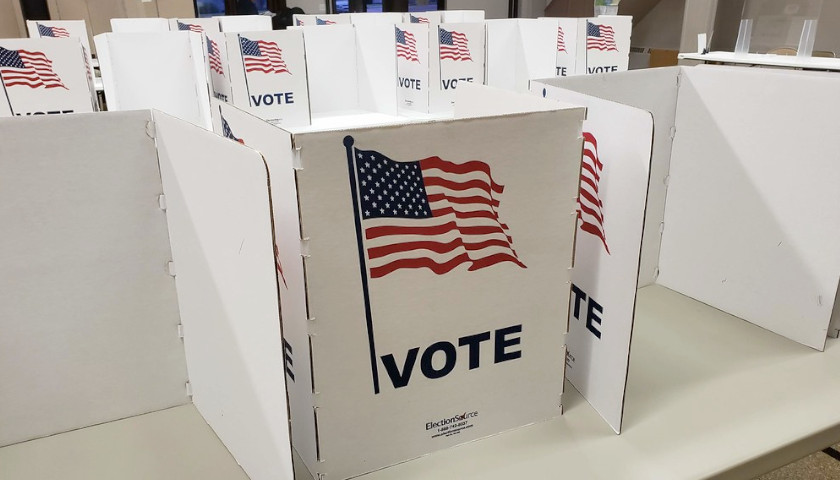by Natalia Mittelstadt
The trial over a 2020 Georgia election case has begun, including mass challenges of voter eligibility and allegations of voter intimidation. Similar legal challenges continue in the state.
On Thursday, the trial of Fair Fight v. True the Vote began, with the plaintiff arguing that the defendants’ challenging the eligibility of more than 364,000 voters in the 2020 presidential election amounts to “voter intimidation.”
Fair Fight is a voting rights PAC founded by twice-defeated Georgia gubernatorial candidate Stacey Abrams, and funded by left-wing fundraiser “ActBlue.” Fair Fight first filed the lawsuit in December 2020, in the weeks leading up to the Senate runoff election in the state.
Abrams herself is considered by many to be the left-wing’s version of an “election denier.” The Washington Post reported that at various times Abrams said gubernatorial election was “stolen” from her, and in a New York Times interview, that “I won.” She suggested that election laws were “rigged” and that it was “not a free or fair election.” She also claimed that voter suppression was to blame for her loss, even though she admitted she could not “empirically” prove that. According to The Post, while she eventually acknowledged Kemp was the governor, she refused to say he was the “legitimate” governor.
The lawsuit alleges that Texas-based True the Vote violated a section of the 1965 Voting Rights Act that prohibits voter intimidation. This violation allegedly occurred by True the Vote challenging the 364,000 voters based on the U.S. Postal Service National Change of Address registry; recruiting “volunteers to monitor voters as they return their ballots and encouraged ‘citizen watchdogs’ to report suspected instances of illegal voting”; and creating “a $1 million reward fund to ‘incentivize’ individuals to report instances of ‘election malfeasance,’” the lawsuit states.
True the Vote has been described by mainstream media outfits as “a prominent right-wing group that promotes debunked voter fraud conspiracies.”
The Fair Fight also argued, “While several counties rejected True the Vote’s mass challenges, and multiple courts have already thrown out their supporters’ frivolous claims of voter fraud, these repeated attempts at voter suppression have lasting effects on of the electorate: lawful voters will be deterred and intimidated from participating in the political process out of fear that they will be accused by Defendants and their supporters of voting illegally.”
The lawsuit additionally asks the Georgia court to adopt the reasoning of a case in Montana, where “one court explained in considering a similar mass challenge effort by the Montana Republican Party to voters based on change of address data, ‘[o]ne can imagine the mischief an immature political operative could inject into an election cycle were he to use the [challenge] statutes, not for their intended purpose of protecting the integrity of the people’s democracy, but rather to execute a tawdry partisan ploy.’”
Fair Fight is asking the court to find that True the Vote violated the 1965 Voting Rights Act and to prevent the organization from operating in Georgia, including submitting challenges to voters’ eligibility or participating in activities related to poll watching.
Fair Fight’s attorneys said that if the court rules against True the Vote, then it could deter similar mass challenges of voter eligibility in Georgia and other states.
True the Vote argues that they were exercising their First Amendment rights to freedom of speech and association and not intimidating voters. The defendants’ trial brief also argues that “it’s reasonable” for someone to confirm that a person hasn’t permanently moved to a different address since the person notifies the USPS and election officials when they move.
The U.S. Department of Justice joined the case, asserting that the voter intimidation section of the 1965 Voting Rights Act does not violate the First Amendment in this instance.
The trial is estimated to take 10 days.
Mass challenges against voters’ eligibility have been filed in Georgia beyond True the Vote’s case.
There is an ongoing case regarding the Fulton County GOP, which is suing the county Board of Commissioners for rejecting its nominee to an elections board, alleging that he was not appointed for having previously raised concerns about voter rolls.
The GOP nominee to Fulton’s Board of Registration and Elections (BRE), Jason Frazier, was rejected in June by the county Board of Commissioners despite meeting all the qualifications to sit on the elections board, the party argues. The commissioners voted 5-2 to not appoint Frazier, one of the two nominees that the county GOP chose for the BRE. The other GOP nominee was appointed to the board.
The county Republican Party alleges in its lawsuit that the Board of Commissioners is violating county law by not appointing the party’s nominee.
Fulton County didn’t immediately respond to a request for comment on Thursday. However, the Fulton County elections department previously told Just the News that it “follow[s] all current laws and rules which are many. We have laws governing how we process address changes, returned mail, moved out of state, moved out of county, non-participants, etc. The only changes, if any, would be to follow new legislation.”
Frazier told Just the News in August that he found about 20,000 duplicate registrations in Fulton County’s voter rolls and believed that “a bulk” of them have been fixed. He also submitted about 10,000 challenges and said that there are around 1,600 voter registrations in “challenge” status.
Following the Board of Commissioners’ rejection of the Frazier nomination to the elections board, Fair Fight commended the decision.
The organization said that the rejection of “the nomination of far-right conspiracy theorist and mass voter challenger Jason Frazier signals that the Fulton Board of Commissioners are committed to defending the integrity of Fulton elections in the face of the GOP’s escalating attacks on democracy at the local, state, and national level.”
– – –
Natalia Mittelstadt graduated from Regent University with Bachelor of Arts degrees in Communication Studies and Government.
Photo “Voting Booths” by Corey Seeman. CC BY-NC-SA 2.0.








